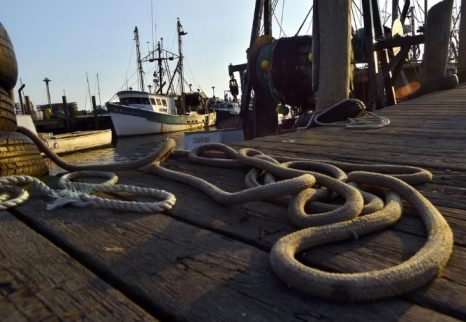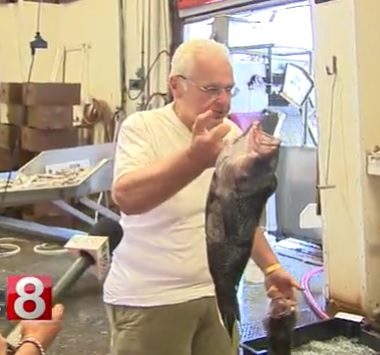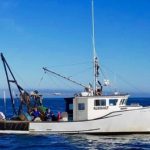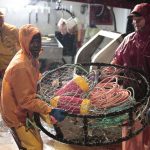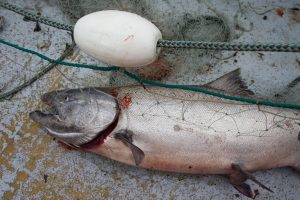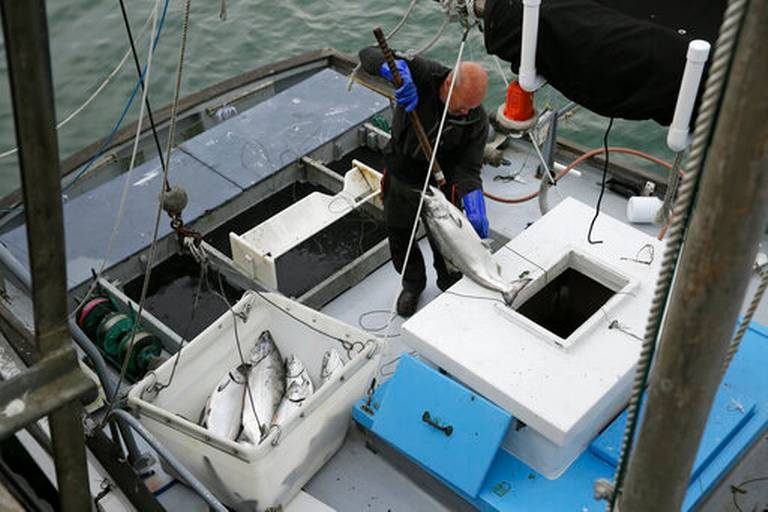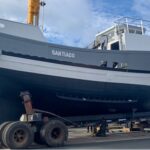Tag Archives: Mid-Atlantic Fishery Management Council
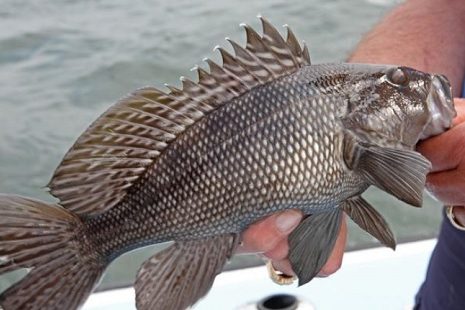
Black sea bass surge off R.I.
Scientists tell us that some fish will be winners and others losers as oceans warm. In Rhode Island, count lobster, silver hake and winter flounder among the losers, their numbers plummeting as climate change drives water temperatures higher. On the list of winners so far are squid, summer flounder, butterfish. And black sea bass. The population of the dusky-colored fish with striking blue accents has historically been strongest off the mid-Atlantic Coast, but over the past decade or so its numbers have spiked off New England and it is becoming a more important catch for the region’s fishermen. How they are managed will have important implications not only for those fish but for lobsters and other key species in the ocean ecosystem. >click to read<12:30
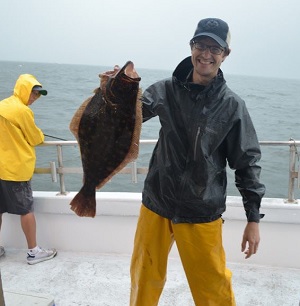
Climate change moving fish north, threatening turf wars, study says
World conflict is likely to increase over access to fisheries, as species move north in response to a warming ocean, according to a Rutgers University study published last week in the journal Science. “Seventy or more countries will likely have to start sharing with their neighbors” in coming decades, said lead author Malin Pinsky, including the U.S., Canada and Mexico.,, Gregory DiDomenico, executive director of the Garden State Seafood Association, said northern states such as New York argue they should now get a larger allotment for their fishing industries. He said allotments, which are set by the Atlantic States Marine Fisheries Commission and the Mid-Atlantic Fishery Management Council, are based on the history of landings by state. >click to read<23:32
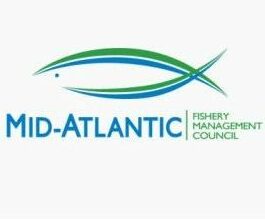
Mid-Atlantic Fishery Management Council Meeting in Philadelphia, June 5 – 7, 2018
The public is invited to attend the June 5 – 7 Mid-Atlantic Fishery Management Council’s meeting at DoubleTree by Hilton Philadelphia Center City 237 South Broad Street, Philadelphia, PA. Briefing documents will be posted as they become available. Meeting Agenda >click to read<. For online access to the meeting, enter as a guest >click here< www.mafmc.org12:12

Mid-Atlantic Fishery Management Council meeting in Raleigh, NC February 13 thru 15, 2018
The public is invited to attend the Mid-Atlantic Fishery Management Council’s meeting in Raleigh, NC at the Hilton Garden Inn Raleigh/Crabtree Valley 3912 Arrow DriveRaleigh, NC, 27612 Briefing Materials & Agenda Overview Agenda >click here< Attend Meeting with Adobe Connect >click here< Listen Live! www.mafmc.org 14:40
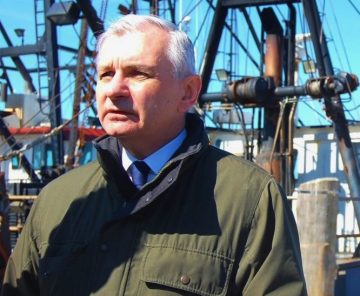
RI Delegation Commends Mid on Squid, introduce legislation in House and Senate – The Rhode Island Fishermen’s Fairness Act
After the Mid-Atlantic Fishery Management Council (MAFMC) recently voted 16-4 against a proposed squid buffer zone framework off the coast of Nantucket, Massachusetts that would have negatively impacted Rhode Island fishermen, U.S. Senators Jack Reed and Sheldon Whitehouse and Congressmen Jim Langevin and David Cicilline commended the council. And this week Reed introduced legislation in the U.S. Senate and Langevin introduced identical legislation in U.S. House of Representatives to give Rhode Island a seat at the council table going forward so that the state and local fishermen have a direct say over matters that impact them. The Rhode Island Fishermen’s Fairness Act, which is cosponsored by Whitehouse and Cicilline, would add Rhode Island to the list of seven states with voting representation on the MAFMC, click here to read press release 19:42

Mid-Atlantic Council Discontinues Development of Squid Buffer Framework
The Mid-Atlantic Fishery Management Council voted last week to discontinue development of a framework action that would have considered establishing a squid fishery buffer zone in waters south of Martha’s Vineyard and Nantucket. This decision will allow the effects of the recently-approved Squid Amendment to be realized prior to any additional action. The Council included the Squid Buffer Framework in its list of possible actions for 2017 in response to public concern regarding longfin squid fishing effort during Trimester 2 (May-August) in an area south of Martha’s Vineyard and Nantucket. click here to read the press release 13:28
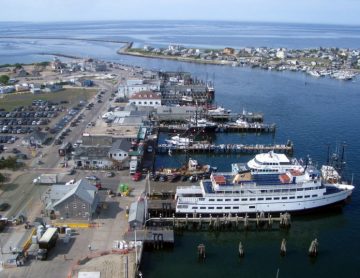
Vote against fishing restrictions seen as win for RI, Galilee
At its meeting Tuesday, the Mid-Atlantic Fishery Management Council voted 16-4 to discontinue a proposed squid buffer zone framework off the coast of Nantucket, Massachusetts, according to Meghan Lapp, fisheries liaison for Seafreeze Ltd “There were a good number of commercial fishermen, squid fishermen present. There were also a good number of people from Nantucket present. Basically everybody that wanted to speak got a chance to speak, and the council did the right thing,” she said. All members of the Narragansett Town Council had signed a letter Dec. 4 requesting the Mid-Atlantic Fishery Management Council “reject further discussion of a buffer zone for the summer squid fishery off Nantucket.” click here to read the story 15:46

Mid Atlantic Fishery Management Council Meeting in Annapolis, MD December 11-14, 2017
The public is invited to attend the Mid-Atlantic Fishery Management Council’s December meeting in Annapolis, MD. Briefing Materials & Agenda Overview Agenda click here Attend Meeting with Adobe Connect Click here Listen Live! 10:38

Mid Atlantic Council considering buffer zone south of Nantucket that would eliminate squid fishing in federal waters in that area
The Council included an action to consider Squid Buffers in the list of “Possible Additions” in the 2017 Implementation Plan. The December 2017 Council meeting would constitute Framework Meeting 1, as per the Frameworks Process Summary. Staff has been able to draft possible alternatives and to develop preliminary related analyses (or use existing analyses). Staff is seeking Council input on next steps. Several recent constituent communications regarding the buffer issue are also included at the end of this tab. Previous public comments have included positions for and against moving forward with this action. click here to read the story Attached are two letters of support for the fishing industry from the Town of Narragansett Town Council and also the Narragansett Chamber of Commerce click here to read the letters 12:43
Cuomo threatens to sue if fluke quotas aren’t reallocated
 Gov. Andrew M. Cuomo threatened Tuesday to sue the federal government if two interstate fishery-management agencies meeting in December fail to reach an “equitable” redistribution of the coastwide quota for fluke. In a letter to U.S. Secretary of Commerce Wilbur Ross on Tuesday, Cuomo wrote it was “imperative” that the federal and interstate agencies take “immediate action” to “reallocate” the quota for fluke “in a fair and equitable manner or New York will be forced to take legal action to protect the interests of fishermen in this state.” Cuomo gave the agencies until December to act. click here to read the story click here to read the letter 09:46
Gov. Andrew M. Cuomo threatened Tuesday to sue the federal government if two interstate fishery-management agencies meeting in December fail to reach an “equitable” redistribution of the coastwide quota for fluke. In a letter to U.S. Secretary of Commerce Wilbur Ross on Tuesday, Cuomo wrote it was “imperative” that the federal and interstate agencies take “immediate action” to “reallocate” the quota for fluke “in a fair and equitable manner or New York will be forced to take legal action to protect the interests of fishermen in this state.” Cuomo gave the agencies until December to act. click here to read the story click here to read the letter 09:46
Strained Fluke Quotas, Hurricanes and Safe Harbor
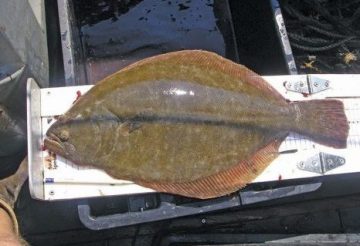 Less than a month after a bill granting vessels safe harbor in New York was signed by Governor Andrew Cuomo, a fishing vessel bound for North Carolina carrying 6,000 pounds of fluke has tested the new policy, straining New York’s federally designated fluke quotas. The F/V Rianda S., which has long been a part of the Montauk fleet, was in transit to land its fish in North Carolina, where it has fishing licenses, on Sept. 17 after fishing in federal waters when it encountered the rough seas generated by Hurricane José and requested safe harbor in Montauk. New York’s fluke fishery is closed for the month of September, due to banner fluke landings this summer that strained the state’s already low federally mandated quotas. click here to read the story 08:25
Less than a month after a bill granting vessels safe harbor in New York was signed by Governor Andrew Cuomo, a fishing vessel bound for North Carolina carrying 6,000 pounds of fluke has tested the new policy, straining New York’s federally designated fluke quotas. The F/V Rianda S., which has long been a part of the Montauk fleet, was in transit to land its fish in North Carolina, where it has fishing licenses, on Sept. 17 after fishing in federal waters when it encountered the rough seas generated by Hurricane José and requested safe harbor in Montauk. New York’s fluke fishery is closed for the month of September, due to banner fluke landings this summer that strained the state’s already low federally mandated quotas. click here to read the story 08:25
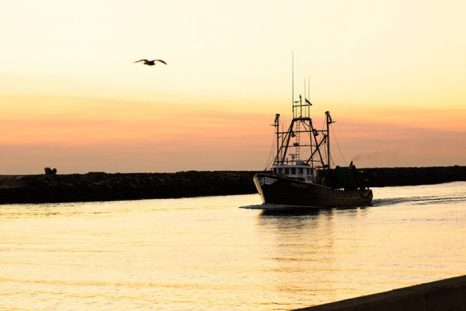
New Jersey Anglers and Commercial Fishermen: Discussion on negative impact of Fishing Limits
A trip to Annapolis, Maryland might be what saves the 2018 New Jersey fishing season. Saltwater anglers and their allies crowded the Stafford Township municipal chambers, where the Marine Fisheries Council held its regular Sept. 7 meeting. Although the first hour was filled with its usual reports and comments, the Council’s second hour saw passionate arguments and discussion from Council and audience members about what to do with the ever-shortening fishing season and its negative impact on commercial fishermen throughout the state and beyond. click here to read the story 15:29
Mid-Atlantic Fishery Management Council meeting August 8 – 10, 2017 in Philadelphia, PA
 The public is invited to attend the Mid-Atlantic Fishery Management Council’s August 2017 meeting to be held August 8-10, 2017 in Philadelphia, PA. The meeting will be held at the Courtyard Marriott, 21 N. Juniper St., Philadelphia, PA 19107, Telephone 215-496-3200. Briefing Materials & Agenda Overview Agenda click here Attend Meeting with Adobe Connect Click here Listen Live! www.mafmc.org 12:12
The public is invited to attend the Mid-Atlantic Fishery Management Council’s August 2017 meeting to be held August 8-10, 2017 in Philadelphia, PA. The meeting will be held at the Courtyard Marriott, 21 N. Juniper St., Philadelphia, PA 19107, Telephone 215-496-3200. Briefing Materials & Agenda Overview Agenda click here Attend Meeting with Adobe Connect Click here Listen Live! www.mafmc.org 12:12
Mid-Atlantic Council Approves Squid Amendment
 The Mid-Atlantic Fishery Management Council approved the Squid Amendment to the Atlantic Mackerel, Squid, and Butterfish Fishery Management Plan during a meeting last week in Norfolk, Virginia. The amendment includes measures to reduce latent (unused) permits in the longfin squid fishery and modify management of longfin squid during Trimester 2. After considerable discussion and consideration of public comments, the Council selected preferred alternatives and adopted the amendment for Secretarial review and implementation. Below are summaries of the issues addressed and the Council’s preferred alternatives. click here to read the notice 16:55
The Mid-Atlantic Fishery Management Council approved the Squid Amendment to the Atlantic Mackerel, Squid, and Butterfish Fishery Management Plan during a meeting last week in Norfolk, Virginia. The amendment includes measures to reduce latent (unused) permits in the longfin squid fishery and modify management of longfin squid during Trimester 2. After considerable discussion and consideration of public comments, the Council selected preferred alternatives and adopted the amendment for Secretarial review and implementation. Below are summaries of the issues addressed and the Council’s preferred alternatives. click here to read the notice 16:55
Mid-Atlantic Fishery Management Council Meeting in Norfolk, VA June 6 – 8, 2017
The public is invited to attend the Mid-Atlantic Fishery Management Council’s Tuesday, June 6, 2017 – Thursday, June 8, 2017 Hilton Norfolk The Main, 100 East Main St. Norfolk, VA. Briefing documents will be posted as they become available (click here). For online access to the meeting, enter as a guest (click here) 11:10
A Hudson Canyon-sized power struggle is developing 100 miles off N.J.’s coast
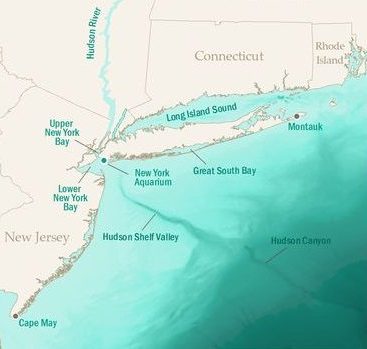 In November 2016, the Wildlife Conservation Society nominated Hudson Canyon to be designated a National Marine Sanctuary. The WCS selected the canyon, the largest submarine crevice on the Atlantic Coast, due to its wide biodiversity. The canyon is home to more than 20 protected species, including the North Atlantic right whale, according to the conservation group. “This is a canyon the scale of the Grand Canyon,” said Jon Forrest Dohlin, the Vice President of the WCS and the director of the New York Aquarium. “It seemed like something that could really benefit from awareness and protection.” But commercial fishermen see this as the latest in a series of moves that could lead to increased fishing restrictions from the Gulf of Maine to the Gulf of Mexico. Commercial fishermen in New Jersey fear losing access to a profitable fishing ground. According the Greg DiDomenico, the executive director of the Garden State Seafood Association, click here to read the story 09:54
In November 2016, the Wildlife Conservation Society nominated Hudson Canyon to be designated a National Marine Sanctuary. The WCS selected the canyon, the largest submarine crevice on the Atlantic Coast, due to its wide biodiversity. The canyon is home to more than 20 protected species, including the North Atlantic right whale, according to the conservation group. “This is a canyon the scale of the Grand Canyon,” said Jon Forrest Dohlin, the Vice President of the WCS and the director of the New York Aquarium. “It seemed like something that could really benefit from awareness and protection.” But commercial fishermen see this as the latest in a series of moves that could lead to increased fishing restrictions from the Gulf of Maine to the Gulf of Mexico. Commercial fishermen in New Jersey fear losing access to a profitable fishing ground. According the Greg DiDomenico, the executive director of the Garden State Seafood Association, click here to read the story 09:54
MAFMC Votes15-4 AGAINST Hudson Canyon Sanctuary bid
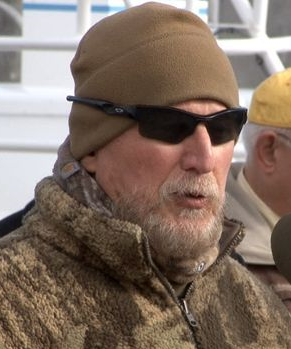 In their official nomination, the Wildlife Conservation Society (WCS) and their Coney Island Aquarium staff outlined their specific reasons for nominating the offshore Hudson Canyon as a National Marine Sanctuary. (We listened to the presentation online. It was pathetic, actually),,, While claiming to have “community-based support for the nomination expressed by a broad range of interests,” the WCS marine sanctuary plan had actual fishermen and fishing industry leaders incensed. In a letter of opposition on behalf of coastal fishermen, Recreational Fishing Alliance (RFA) executive director Jim Donofrio noted that regardless of the WCS’s intention, recreational fishermen would not have any legal protection under the federal sanctuary law. Thank you Jim. click here to read the story 12:54
In their official nomination, the Wildlife Conservation Society (WCS) and their Coney Island Aquarium staff outlined their specific reasons for nominating the offshore Hudson Canyon as a National Marine Sanctuary. (We listened to the presentation online. It was pathetic, actually),,, While claiming to have “community-based support for the nomination expressed by a broad range of interests,” the WCS marine sanctuary plan had actual fishermen and fishing industry leaders incensed. In a letter of opposition on behalf of coastal fishermen, Recreational Fishing Alliance (RFA) executive director Jim Donofrio noted that regardless of the WCS’s intention, recreational fishermen would not have any legal protection under the federal sanctuary law. Thank you Jim. click here to read the story 12:54
Mid-Atlantic Fishery Management Council Meeting in Avalon, New Jersey: April 11-13, 2017
The public is invited to attend the Mid-Atlantic Fishery Management Council’s April 2017 meeting to be held April 11-13, 2017 in Avalon, New Jersey. The meeting will be held at the Icona Golden Inn, 7849 Dune Dr., Avalon, NJ, Telephone 609-368-5155. Briefing documents will be posted as they become available (click here). For online access to the meeting, enter as a guest (click here) This link is now active! 09:56
Wildlife Conservation Society’s New York Aquarium wants Hudson Canyon National Marine Sanctuary designation
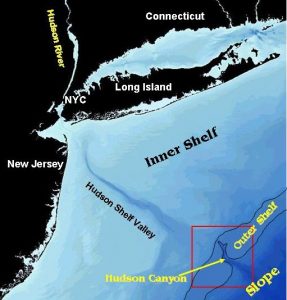 Fishermen not on board with Hudson Canyon Sanctuary – The Mid-Atlantic Fishery Management Council will hear a proposal from New York Aquarium, which has nominated the canyon for a National Marine Sanctuary designation. The sanctuary program is run by the National Oceanic and Atmospheric Administration. In the program’s 40 years of existence 13 national marine sanctuaries and two marine national monuments have been established. The sanctuaries are to be tailored to the needs of its stakeholders. (This does not include you, Fishermen) New Jersey fishermen however, are raising concerns that they will be shut out of a prolific fishing ground. “We’re in complete opposition. We’re not going to be fooled by the notion that the aquarium doesn’t intend to severely restrict fishing over time,” said Greg DiDomenico, Executive Director, Garden State Seafood Association. (We also oppose this) click here to read the story 09:48 Little-known-Underwater-Canyon-off-New-York-and-New-Jersey-Nominated-as-National-Marine-Sanctuary 09:58
Fishermen not on board with Hudson Canyon Sanctuary – The Mid-Atlantic Fishery Management Council will hear a proposal from New York Aquarium, which has nominated the canyon for a National Marine Sanctuary designation. The sanctuary program is run by the National Oceanic and Atmospheric Administration. In the program’s 40 years of existence 13 national marine sanctuaries and two marine national monuments have been established. The sanctuaries are to be tailored to the needs of its stakeholders. (This does not include you, Fishermen) New Jersey fishermen however, are raising concerns that they will be shut out of a prolific fishing ground. “We’re in complete opposition. We’re not going to be fooled by the notion that the aquarium doesn’t intend to severely restrict fishing over time,” said Greg DiDomenico, Executive Director, Garden State Seafood Association. (We also oppose this) click here to read the story 09:48 Little-known-Underwater-Canyon-off-New-York-and-New-Jersey-Nominated-as-National-Marine-Sanctuary 09:58
Mid-Atlantic Council to Hold Public Hearings for Squid Amendment
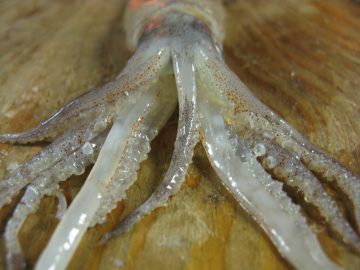 The Mid-Atlantic Fishery Management Council will hold nine public hearings in April and May 2017 to solicit public input on the Squid Amendment to the Atlantic Mackerel, Squid, and Butterfish Fishery Management Plan. The Council is also soliciting written comments on the amendment through 11:59 pm on May 18, 2017.The amendment considers measures to reduce latent longfin and Illex squid permits. Currently, a relatively small portion of vessels with limited access (“moratorium”) squid permits account for the majority of landings in most years. The Council is concerned that activation of latent permits in the squid fisheries could lead to excessive fishing effort, potentially resulting in shortened seasons and increased catch of non-target species. The amendment also considers measures to modify the management of longfin squid during Trimester 2 (May-August). The Council is considering this action because there is concern that the productivity of the longfin squid stock may be negatively impacted if excessive fishing in Trimester 2 does not allow sufficient spawning and/or successful egg hatching from egg mops. Locations of the hearings with time and date, public comment info, Click Here 17:54
The Mid-Atlantic Fishery Management Council will hold nine public hearings in April and May 2017 to solicit public input on the Squid Amendment to the Atlantic Mackerel, Squid, and Butterfish Fishery Management Plan. The Council is also soliciting written comments on the amendment through 11:59 pm on May 18, 2017.The amendment considers measures to reduce latent longfin and Illex squid permits. Currently, a relatively small portion of vessels with limited access (“moratorium”) squid permits account for the majority of landings in most years. The Council is concerned that activation of latent permits in the squid fisheries could lead to excessive fishing effort, potentially resulting in shortened seasons and increased catch of non-target species. The amendment also considers measures to modify the management of longfin squid during Trimester 2 (May-August). The Council is considering this action because there is concern that the productivity of the longfin squid stock may be negatively impacted if excessive fishing in Trimester 2 does not allow sufficient spawning and/or successful egg hatching from egg mops. Locations of the hearings with time and date, public comment info, Click Here 17:54
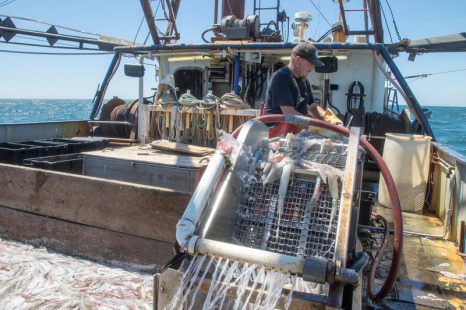
After a record run of squid, local fishermen warily eye competition, regulatory challenges
It was the best single run of longfin squid anyone on the East Coast had ever seen – and it happened fast and was over fast. In two months last summer, June and July, the East Coast-based squid fleet landed approximately 14 million pounds, with Rhode Island landing more than 50 percent of that quota, according to National Oceanic and Atmospheric Administration landing reports. “I’ve never seen anything like it. The squid just kept coming,” said Point Judith fisherman Jeff Wise of Narragansett. “I’ve never seen volume and catch rates that high before.”,,,Three policy issues surfaced in recent months that could affect Rhode Island squid vessels and processors. One concerns managing the number of squid permits allowed, an issue perennially raised by the commercial fishing industry. The other two concern the possible loss of fishing ground – one by proposed wind farms off Long Island, and the other from lobbying pressure for a buffer zone in a key squid area south of Nantucket and Martha’s Vineyard. Big read! Read the article here 07:47
MAFMC & ASMFC Set Black Sea Bass Specs for 2017-18 – Benchmark Assessment Finds Resource Not Overfished & Overfishing Not Occurring
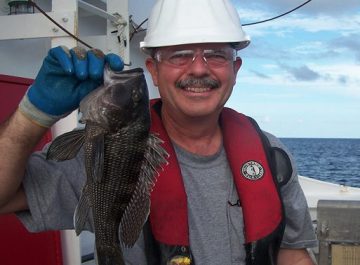 The Mid-Atlantic Fishery Management Council (Council) and the Atlantic States Marine Fisheries Commission (Commission) have approved revised specifications for the 2017 black sea bass fishing year as well as specifications for the 2018 fishing year for the Northern black sea bass stock (Cape Hatteras, North Carolina to the US-Canadian border). The revised specifications are based on the results of the 2016 benchmark stock assessment, which found the stock is not overfished and overfishing is not occurring. The approved limits are consistent with the recommendations of the Council’s Science and Statistical Committee. The Commission’s actions are final and apply to state waters (0-3 miles from shore). The Council will forward its recommendations for federal waters (3 – 200 miles from shore) to NOAA Fisheries Greater Atlantic Regional Fisheries Administrator for final approval. Read the rest here 11:23
The Mid-Atlantic Fishery Management Council (Council) and the Atlantic States Marine Fisheries Commission (Commission) have approved revised specifications for the 2017 black sea bass fishing year as well as specifications for the 2018 fishing year for the Northern black sea bass stock (Cape Hatteras, North Carolina to the US-Canadian border). The revised specifications are based on the results of the 2016 benchmark stock assessment, which found the stock is not overfished and overfishing is not occurring. The approved limits are consistent with the recommendations of the Council’s Science and Statistical Committee. The Commission’s actions are final and apply to state waters (0-3 miles from shore). The Council will forward its recommendations for federal waters (3 – 200 miles from shore) to NOAA Fisheries Greater Atlantic Regional Fisheries Administrator for final approval. Read the rest here 11:23

Mid-Atlantic Fishery Management Council Meeting in Kitty Hawk, North Carolina: February 14-16, 2017
The public is invited to attend the Mid-Atlantic Fishery Management Council’s February 2017 meeting to be held February 14-16, 2017 in Kitty Hawk, North Carolina. The meeting will be held at the Hilton Garden Inn Kitty Hawk, 5353 N. Virginia Dare Trail, Kitty Hawk, NC 27949. Webinar: For online access to the meeting, Click here Meeting Materials: Briefing documents will be posted as they become available. Click here 11:10
Controversial flounder plan could get final approval Thursday
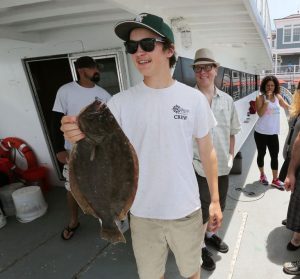 A proposal to drastically reduce this year’s summer flounder catch could get final approval at a federal regulatory meeting Thursday morning in Virginia. The Atlantic States Marine Fisheries Committee is scheduled consider strategies that would reduce the summer flounder harvest by up to 41 percent coast-wide and implement tighter restrictions on bag and size limits for recreational fishermen. It’s a proposal that has been met with widespread criticism in New Jersey—from recreational fishermen, both U.S. Senators, multiple other politicians and even the head of the state Department of Environmental Protection. In August, the ASMFC and the Mid-Atlantic Fishery Management Council set the summer flounder harvest limit at an all-time low in response to the most recent stock assessment, and, last month, the regulatory bodies approved a set of options to meet that goal. Read the rest of the story here 21:27
A proposal to drastically reduce this year’s summer flounder catch could get final approval at a federal regulatory meeting Thursday morning in Virginia. The Atlantic States Marine Fisheries Committee is scheduled consider strategies that would reduce the summer flounder harvest by up to 41 percent coast-wide and implement tighter restrictions on bag and size limits for recreational fishermen. It’s a proposal that has been met with widespread criticism in New Jersey—from recreational fishermen, both U.S. Senators, multiple other politicians and even the head of the state Department of Environmental Protection. In August, the ASMFC and the Mid-Atlantic Fishery Management Council set the summer flounder harvest limit at an all-time low in response to the most recent stock assessment, and, last month, the regulatory bodies approved a set of options to meet that goal. Read the rest of the story here 21:27
Fluke Cut Rally scheduled for Friday, 10 am at Fishermen’s Supply in Point Pleasant Beach
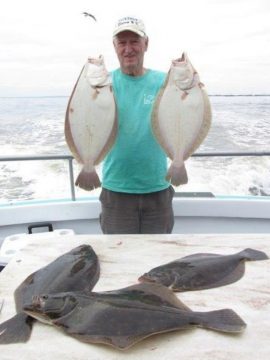 A rally against the proposed cuts to the summer flounder harvest is planned for this Friday morning in the parking lot of Fishermen’s Supply in Point Pleasant Beach. Along with members of the fishing community, the commissioner of the state Department of Environmental Protection Bob Martin and U.S. Congressman Frank Pallone (D-N.J.) will lead the rally and speak in opposition to the harvest reduction. Both Martin and Pallone have been critical of the Atlantic State Marine Fisheries Commission and the Mid-Atlantic Fishery Management for their proposed drastic cuts to the summer flounder harvest. Pallone has been outspoken against the science used to count fish landings and stock biomass that has led those management bodies to conclude that anglers overfished their quota last year and the biomass of summer flounder is shrinking. Read the rest here 12:32
A rally against the proposed cuts to the summer flounder harvest is planned for this Friday morning in the parking lot of Fishermen’s Supply in Point Pleasant Beach. Along with members of the fishing community, the commissioner of the state Department of Environmental Protection Bob Martin and U.S. Congressman Frank Pallone (D-N.J.) will lead the rally and speak in opposition to the harvest reduction. Both Martin and Pallone have been critical of the Atlantic State Marine Fisheries Commission and the Mid-Atlantic Fishery Management for their proposed drastic cuts to the summer flounder harvest. Pallone has been outspoken against the science used to count fish landings and stock biomass that has led those management bodies to conclude that anglers overfished their quota last year and the biomass of summer flounder is shrinking. Read the rest here 12:32
Coral plan threatens fishing grounds
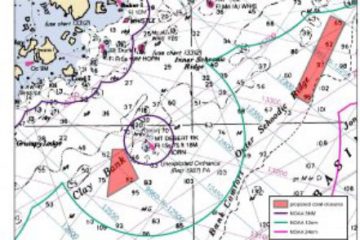 The NEFMC is working with the Mid-Atlantic Fishery Management Council and the South Atlantic Fishery Management Council to preserve deep-sea corals from the Canadian border to Virginia. Area lobstermen could lose valuable fishing grounds if a federal proposal to close four areas of Gulf of Maine waters comes to fruition. The New England Fishery Management Council (NEFMC) has drafted a plan that would close a span of 161 square miles offshore to commercial fishing in an effort to conserve deep-sea coral there. Two of those areas, Mount Desert Rock in Lobster Management Zone B and Outer Schoodic Ridge in Lobster Management Zone A, are preferred fishing grounds for local fishermen when lobster head further offshore in the winter. The other proposed offshore closure areas lie in Jordan Basin and Lindenkohl Knoll to the south. Read the story here 09:34
The NEFMC is working with the Mid-Atlantic Fishery Management Council and the South Atlantic Fishery Management Council to preserve deep-sea corals from the Canadian border to Virginia. Area lobstermen could lose valuable fishing grounds if a federal proposal to close four areas of Gulf of Maine waters comes to fruition. The New England Fishery Management Council (NEFMC) has drafted a plan that would close a span of 161 square miles offshore to commercial fishing in an effort to conserve deep-sea coral there. Two of those areas, Mount Desert Rock in Lobster Management Zone B and Outer Schoodic Ridge in Lobster Management Zone A, are preferred fishing grounds for local fishermen when lobster head further offshore in the winter. The other proposed offshore closure areas lie in Jordan Basin and Lindenkohl Knoll to the south. Read the story here 09:34
Party boat captains irate over summer flounder cuts
 Few things are causing more ire among recreational fishermen than the summer flounder cuts. Some party boat captains have called it “nail in the coffin” measures that are being taken by fishery management that starts from the top down with the National Oceanic and Atmospheric Administration. “It seems that every time we make a sacrifice there ends up being less boats on the water. It seems like they want us off the water,” said Gambler party boat owner and captain Bob Bogan. The Mid-Atlantic Fishery Management Council is recommending a 3.77 million pound recreational harvest limit for 2017. That’s down from 5.42 million in 2016. Read the story here 18:32
Few things are causing more ire among recreational fishermen than the summer flounder cuts. Some party boat captains have called it “nail in the coffin” measures that are being taken by fishery management that starts from the top down with the National Oceanic and Atmospheric Administration. “It seems that every time we make a sacrifice there ends up being less boats on the water. It seems like they want us off the water,” said Gambler party boat owner and captain Bob Bogan. The Mid-Atlantic Fishery Management Council is recommending a 3.77 million pound recreational harvest limit for 2017. That’s down from 5.42 million in 2016. Read the story here 18:32






